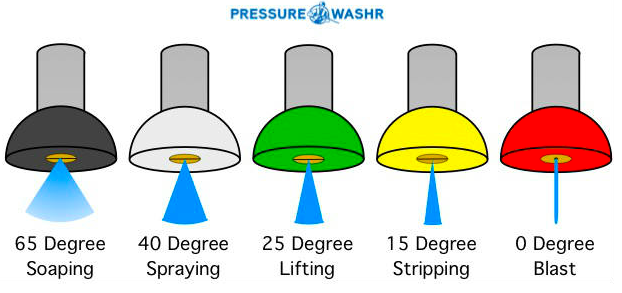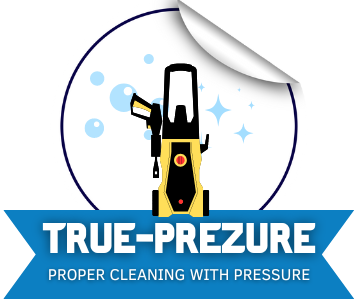Are you frustrated with a pressure washer that just won’t clean like it used to?
The culprit could be a clogged nozzle! Over time, debris can build up and hinder the flow of water from your pressure washer. But don’t worry – unclogging it is easier than you might think.
In this comprehensive guide, we’ll walk you through the causes of clogs and how to fix them, as well as give tips for maintaining your pressure washer’s nozzles so you can keep it running smoothly for years to come.
Say goodbye to weak sprays and hello to a sparkling clean outdoor space with our full guide on how to unclog a pressure washer.
How Do Pressure Washer Nozzles Work?
Pressure washer nozzles are responsible for controlling the flow of water from your pressure washer. They come in a variety of sizes and spray patterns, allowing you to customize your cleaning approach based on the task at hand.
The nozzle’s size determines how much water flows through it – smaller nozzles result in higher pressure while larger ones produce more volume. Similarly, different spray patterns can be achieved by using nozzles with varying angles and shapes.
When you pull the trigger on your pressure washer, water is forced into the pump where it’s pressurized before traveling through a hose and out of the nozzle. The high-pressure flow created by this process is what makes pressure washers so effective at removing dirt and grime from surfaces.
It’s important to choose the right nozzle for each job to avoid damaging surfaces or causing injury. For example, a narrow spray pattern should be used for tough stains like oil or grease while wider patterns are better suited for rinsing large areas like decks or patios.
Understanding how pressure washer nozzles work will help you make informed choices about which one to use for specific tasks, ensuring that you get great results every time without risking damage or injury.
What Are The Factors Causing A Clogged Pressure Washer?
A clogged pressure washer can be a frustrating problem, especially if you need it for an important task. But what causes a pressure washer to get clogged in the first place?
One of the most common factors causing a clogged pressure washer is debris buildup. This can happen when using unfiltered water or if there is dirt and debris on the surface being cleaned. Over time, these particles will accumulate in your nozzle and block the flow of water.
Another culprit could be hard water mineral deposits which form over time due to dissolved minerals in tap water, creating limescale buildup that blocks your nozzle’s opening.
Using low-quality detergents with harsh chemicals not only damages surfaces but may also cause residue build-up within your machine leading to potential blockages.
Leaving detergent inside the system without flushing it out properly after use can lead to soap scum accumulation and eventually cause blockage issues.
By understanding these factors causing clogging on your pressure washer nozzles, you can take preventative measures such as filtering off tap water before usage or regularly flushing out any remaining detergent from your machine after each use ensuring uninterrupted productivity with less downtime.
What Will Happen To A Clogged Pressure Washer?
A clogged pressure washer can lead to a lot of problems, both for your machine and for you. Firstly, it can cause damage to the pump, which is one of the most crucial parts of a pressure washer. When the water flow is restricted due to a clog or blockage in the nozzle or hose, it puts extra strain on the pump.
As a result, this added stress can eventually lead to cracks in the pump’s housing or even irreparable damage over time. A damaged pump will not work effectively and may need complete replacement.
Furthermore, if left unchecked for too long, a clogged pressure washer may cause water leakage around seals and valves leading to unwanted leaks that could be difficult to fix without professional help.
Moreover, when there is no proper water flow due to blockages in hoses or nozzles caused by dirt accumulation inside them; It affects cleaning efficiency as well.
In conclusion: A clogged pressure washer causes significant harm not only on its health but also on your wallet; maintenance and care are necessary!
How To Unclog A Pressure Washer
If you’re having trouble with a clogged pressure washer, don’t worry! It’s a common problem that can be solved by following some simple steps. Before starting the process of unclogging your pressure washer, make sure to turn off the machine and unplug it from its power source.
The first step is to remove the nozzle from the wand and clean it thoroughly with a soft-bristled brush or toothpick. Be careful not to damage any of the nozzle’s delicate parts while cleaning it.
Next, check for any debris or obstructions in your pressure washer’s hoses and filter screens. Remove any blockages you find using pliers or tweezers.
If there are still no signs of improvement, try flushing out your pressure washer system with water at high pressure – this should clear out any remaining clogs.
Consider upgrading your current detergent if it’s causing issues for your machine – some detergents cause buildup that can lead to clogs over time. By following these easy steps, you’ll have an unclogged pressure washer ready for use again!
How To Maintain A Pressure Washer’s Nozzles
Maintaining a pressure washer’s nozzles is crucial to ensuring optimal performance and longevity. Here are some simple steps to follow:

1. Always clean the nozzle after use: This will prevent any debris or dirt from building up in the nozzle and causing clogs.
2. Check for wear and tear: The nozzle can become worn over time, which can lead to decreased water pressure or leaks. Regularly inspect the nozzle for signs of damage or wear.
3. Use a descaling solution: If you live in an area with hard water, minerals can build up inside the nozzle and cause blockages. Using a descaling solution once every few months will help prevent this issue.
4. Store properly: When not in use, store your pressure washer with the nozzle removed to prevent any potential damage or clogging during storage.
By following these simple maintenance tips, you can extend the life of your pressure washer’s nozzles and ensure that it continues to perform at its best for years to come!
Conclusion
As we wrap up this comprehensive guide on how to unclog a pressure washer, it’s essential to remember that prevention is always better than cure. By regularly checking your equipment and performing proper maintenance tasks, you can avoid most clogging issues in the first place.
Moreover, understanding the factors causing clogs can help you identify potential problems before they escalate into more significant complications. Keep an eye out for debris, mineral buildup from hard water sources, or damaged parts that might be affecting your pressure washer’s performance.
FAQ
Can a pressure washer hose get clogged?
Frequently asked questions (FAQs) are important for any topic and pressure washers are no exception. One common question that comes up is whether a pressure washer hose can get clogged.
The answer is yes, a pressure washer hose can indeed become clogged. This is particularly likely if you use hard water or water with high mineral content in your pressure washer. Minerals such as calcium and magnesium can build up inside the hose over time, leading to blockages that prevent water from flowing properly.
Another reason why a pressure washer hose may become clogged is if it has been damaged or kinked in some way. If the hose gets bent at an angle, this can restrict the flow of water through it and cause blockages.
To avoid these issues, make sure to use soft water whenever possible when operating your pressure washer. You should also be careful not to damage the hose by bending it too sharply or allowing it to get tangled during use.
While a clogged pressure washer hose may be frustrating, there are steps you can take to prevent this issue from occurring in the first place and keep your equipment running smoothly for years to come.
Why is no water coming out of my pressure washer?
In summary, unclogging a pressure washer can be a frustrating task, especially when you’re not sure what to do. However, by following the steps outlined in this guide, you should have an easier time keeping your nozzle and other components clean.
It’s also important to note that regular maintenance of your pressure washer’s nozzles is crucial for preventing clogs from happening in the first place. Always make sure to read the manufacturer’s instructions on how best to maintain your machine.
If water isn’t coming out of your pressure washer altogether, it could be due to several reasons like low water supply or airlocks in the system. If none of our tips work for you and there’s still no water coming out of your equipment after some troubleshooting attempts, then it may be time to call in a professional or contact customer support.
Why is no water coming out of my pressure washer?
If there’s still no water coming out after ensuring all connections are tight and checking for any blockages like debris or kinks within hoses – try these simple fixes:
– Check if inlet filters are clogged
– Ensure enough water flow towards pump
– Clear any air locks by releasing trigger gun while motor is running
By addressing these issues promptly and taking care of proper maintenance regularly – you’ll ensure reliable performance from your pressure cleaner every time!

